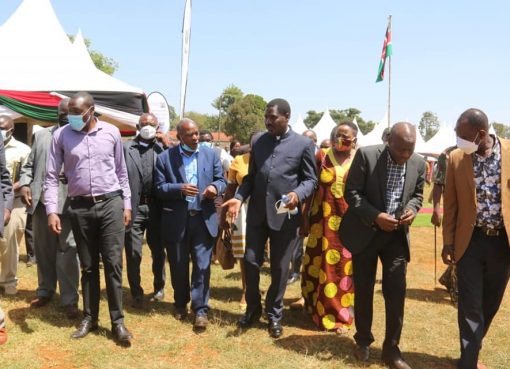Twenty five Form Three students from five Secondary schools across the country will join agricultural scientists and Information and Communication Technology (ICT) experts from across the globe set to converge in Nakuru for the Second Edition of Digital Farmers Conference and Exhibition in the County towards the end of September.
For the first time, the students have been accorded an opportunity to make presentations alongside a panel of local and international academics, agricultural engineers and policy on the role of Information and Communication Technologies (ICTs) in Sustainable Agricultural practices. The two-day event, set for September 27th and 28th is scheduled be held at Egerton University’s Agricultural Resources Centre within Njoro Sub-County.
The twenty five students to participate during the conference are drawn from Njoro Day, Mary Mount, Baraka, Turi and Kilimo secondary schools with each school producing five presenters.
The conference themed ‘Creating the Future Together’ and organized by Centre for Strengthening Capacities for Agricultural Education, Research & Adoption in Kenya (SCARA) comes at a time when the agricultural industry in Africa is experiencing a transformation driven by the increased adoption of technology on different frontiers.
It is sponsored by University of Natural Resources and Life Sciences-Vienna, Austria and Australian Development Agency (ADA) under the auspices of Austrian Partnership Programme in Higher Education and Research for Development (APPEAR) in collaboration with Egerton University.
The SCARA Project Principal Investigator, Prof. Benedict Mwavu Mutua said the event would explore emerging problems and new ICT solutions to address the effects of climate change and climate variability in the agricultural sector, proposing common strategies and guidelines for incorporating risk management to climate change.
Prof. Mutua who is also the Deputy Vice Chancellor at Kibabii University in charge of Planning, Partnerships, Research and Innovation said participants would identify issues in agriculture that could be addressed using ICT, examine how ICT is empowering farmers and consumers along value addition chain and show case the existing possibilities and developments in digital farming.
The Project’s Co-coordinator, Dr. Raphael Mwaura Gacheiya said inclusion of students studying agriculture at the forum is due to findings that integration of ICT in teaching the subject was effective in instructional delivery strategies in the aspects of crop production, livestock production, soil science, agricultural economics and agricultural engineering.
“Currently, the world over, agriculture is no longer just about crop production or livestock farming activities. Our young learners must be prepared to deploy ICT in countering the challenges brought forth by ecological factors affecting the environment,” he observed.
“Agriculture students need to master skills that preempt environmental impact due to climate change and come up with innovative mobile applications that will link farmers to markets and proper agronomical practices. This is where modern technology comes to rescue,” stated Dr. Gacheiya who lecturers at Egerton University.
As a strategy to attain food and nutrition security and reduce rural poverty through research and innovation Dr. Gacheiya observed that most countries around the world are focusing on approaches to integrate ICT in teaching and learning of Agriculture.
He said ICT and e-learning would play a major role in the development and economic growth of African countries in the future, the agricultural sector being the backbone.
“Youths at secondary schools naturally possess good health, strength and vigour which they could exploit to their advantage to contribute in achieving food security in the society. This can be realized through dissemination of knowledge and skill through e-learning platforms,” he noted.
“We need to prepare Secondary School students with abilities to get critical agricultural information like incidence of pests and crop-yields using mobile-based applications. They need to know that through ICT platforms, data collection is faster than traditional methods; more people can be interviewed in less-time using minimum resources. This will help crop experts improve the quality and quantity of data in respect of plant diseases and pests,” stated the Co-coordinator.
Prof. Mutua stated the SCARA Conference and Exhibition expects to draw participation from Ministry of Agriculture, department of ICT at the Ministry of Information Communication Technology, County governments of Nakuru and Nyandarua and government agencies.
Also in attendance will be international development agencies, smallholder farmers groups as well as the general public. Already, over 120 firms from agriculture, technology, investment as well as finance and banking have expressed interest in participation.
Governor Lee Kinyanjui said he was elated that his County was hosting the Digital Farmers’ Conference for second time which he noted was a critical contribution towards achieving one of the government’s Big 4 agenda on food security.
“My administration has been very supportive at all initiatives geared towards digitization of agriculture. We have documented evidence on the positive effect of multiple hardware and software applications for farmers developed by Kenya Agricultural Livestock and Research Organization (KALRO), Kenya Plant Health Inspectorate Services (KEPHIS), Kenya Seed Company and East Africa Breweries (EABL) among others,” said the governor.
“I Am pleased that educational and research institutions, the private sector and government agencies in Kenya have stepped up efforts in tackling agricultural challenges bedeviling application of ICT in farming. It very encouraging that they have been developing innovative technologies for ICT in Agriculture but this is not enough though. We must come up with new ideas to have more ICT innovations in agriculture,” Kinyanjui said.
Also on board at the two day event will be researchers and experts with common interest in the interdisciplinary fields of ICT applicable to adapting agriculture to climate change. It will further incorporate local and international decision-makers in agriculture and technology drawn from public and private sectors.
The Nakuru County Executive Committee Member for Agriculture, Dr. Immaculate Njuthe Maina said the conference was timely as emerging ICT technologies were having a significant impact on developments in agriculture.
“Ways through which farmers access information and use this knowledge to improve crop production, water productivity and access markets will greatly determine viability of agricultural practices and food security in the country.
Both National and County governments on the other hand can leverage on a whole range of technologies to improve extension agent practices and effectiveness. Research has also shown that adoption rate of new technologies in the agricultural sector tends to be low, which can be attributed to various socioeconomic factors, changes in farming systems and external actors like climate variability and policies,” said Dr. Maina.
Dr. Gacheiya said the organizers have also lined up resource persons and experts who will deliver lectures and research papers on strategies that will promote participation of Youth and Women in Agriculture in developing economies and participatory and learning centered methods for research and development.
The event will also tackle socio-cultural and gender aspects of sustainable technology adoption at farm level and barriers and opportunities in innovative knowledge sharing and learning approaches for technology adoption in agriculture.
“Globally, the emerging concept of e-agriculture incorporates the sophisticated use of innovative information and communication technologies (ICT). The technology has the potential to revolutionize the agricultural sector due to its affordability, accessibility, and adaptability. This technology empowers different stakeholders involved in the value chain to perform tasks quickly, efficiently, and with greater ease and accuracy,” he said.
“Our farmers need to embrace ICT as it can help them improve local economies and the quality of life by making informed decisions. These ICT tools can be our new arsenal in the fight against hunger and in feeding the billions,” said Dr. Gacheiya.
The conference will also discuss issues related to ICT trends and their impact on agriculture and rural development capacity building, enabling environments and sustainability.
The governor observed that with regard to Digitalized Farming, ICTs could be deployed for useful purposes including land-use planning, crop forecasting and early warning systems. In addition to that, ICT tools could enable farmers to exploit their farming potential by getting timely, accurate and relevant information on sustainable agricultural practices, water management, pest and disease control, soil testing and post-harvest management techniques.
“Through investment and training in digital farming our farmers will enjoy superior seed quality have easy access to markets and get information on new technological advancements in the agricultural sector,” he said.
The Conference will also take into account the influences of mobile technologies in agribusiness including mobile banking and remittances, access to financing and loans, on line retailing and notice of product recalls. Its overall goal is to empower smallholder farmers and their value chains on new and existing ICT innovations.
Kinyanjui suggested that community telecentres with access to the Internet, telephone and fax services be set up in rural areas to make relevant information available to the farmers.
“Farmers can use these telecenters to enhance communication with potential buyers and to access information on improved farming techniques. Farmers can only increase productivity and profitability to meet growing urban demand and their own needs if they have access to stronger, more equitable market systems, and new technological innovations,” he said.
On current challenges for ICT in agriculture in Kenya, the governor noted that there was still low access to ICT facilities in rural areas as people there have limited access to ICT tools apart from computers.
“Farmers are willing to embrace ICT. All we need to do is put up education and awareness raising programmes. ICT-enabled marketing and access to markets plays a major role, especially for information on market prices and demand. ICT-enhanced marketing and certification strengthens the capacity of small-scale producers to increase revenue by improving their position on local and international markets,” the governor said.
By Anne Mwale




